A protest against Egypt interim government in Istanbul on August 17, 2013, ordered by Erdogan and organized by the Foundation for Human Rights and Freedoms and Humanitarian Relief (İnsan Hak ve Hürriyetleri ve İnsani Yardım Vakfı, or IHH).
Anti-Egypt protests in Turkey and other countries were personally coordinated by then-Prime Minister and current Turkish President Recep Tayyip Erdoğan when embattled President Mohamed Morsi, his close ally, was ousted from power amid popular protests in Egypt, a secret wiretap has revealed.
The transcript of the phone conversation, wiretapped as part of a criminal investigation into an organized crime network in Turkey in 2013, revealed that Erdoğan mobilized rallies and brushed aside concerns that Turkey might be left alone in its campaign against the Egyptian leadership. The conversation also lays bare the ideological zealotry that motivates the Turkish president in his bid to promote his political ambitions, claim the leadership of the Islamic world and assume the position of benefactor of the Muslim Brotherhood at the expense of Turkish national interests.
The transcript of the tape, recorded on August 16, 2013 at 15:31 hours, shows Erdoğan, then prime minister, telling Saudi businessman Yasin al-Qadi, at one time listed as an al-Qaeda financier by the UN and the US, that all the good things in his life were overshadowed by the developments in Egypt. “Tomorrow, we will be in the northwestern province of] Bursa with our people to stand by our brothers in Egypt. A major funeral for martyrs in Egypt was held there today,” Erdoğan said, adding that Turkey’s Religious Affairs Directorate (Diyanet) had undertaken the leading role in organizing funeral prayers nationwide. The Diyanet, a government agency under Erdoğan’s presidency, controls some 90,000 mosques and employs close to 150,000 imams and other religious clergy in Turkey and abroad.
“There will be a major gathering in [the central province of] Konya tomorrow [as well], while we’re in Bursa,” Erdoğan continued, making the point that such rallies must be rapidly expanded. Al-Qadi lamented that the Arab world remained silent about the ouster of Morsi and that that made him more upset than what he described as the Christian Club’s reaction. Erdoğan agreed with al-Qadi’s assessment.
Transcript of the wiretap revealing how Erdoğan organized anti-Egypt rallies
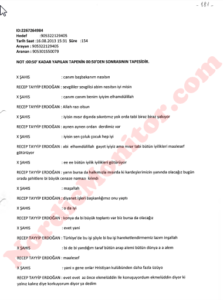
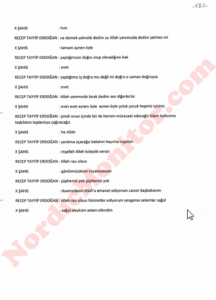
A review of the public events before and after this recorded wiretap confirms what Erdoğan said privately. On August 15 a series of rallies were held in various provinces around Turkey. A group gathered outside of the Egyptian Consulate in İstanbul’s Beşiktaş district. On August 16, thousands gathered in the yard of İstanbul’s Eyüp Sultan Mosque after Friday prayer to perform a funeral prayer for those who were killed in Egypt. After the prayer, crowds led by nongovernmental organizations staged a protest, holding aloft Egyptian and Turkish flags along with posters of the ousted Morsi. Five hundred protesters held placards and chanted slogans outside İstanbul’s Fatih Mosque after Friday prayer.
In Bolu province the Humanitarian Aid Foundation (İHH) and Civil Servants’ Trade Union (Memur-Sen), both pro-Erdoğan groups, led a march of hundreds chanting slogans supporting Morsi after Friday prayer at the Yıldırım Bayezid Mosque. More protests were staged in many parts of Turkey, including Diyarbakır, Mardin, Erzurum, Bursa, Kayseri, Yalova, Bitlis, Adana, Samsun, Trabzon, Amasya, the Çaycuma district of Zonguldak and the Sandıklı district of Afyonkarahisar province. Protesters across Turkey shouted slogans against then-Egyptian army chief Abdel Fattah el-Sisi, the United States and Israel.
On August 17, Erdoğan went to Bursa as he had informed al-Qadi on the phone and delivered the harshest criticism of Egypt ever, likening then-army chief el-Sisi to Syrian President Bashar al-Assad and claiming that there was “state terrorism” in Egypt. Speaking at the opening ceremony of an urban transformation project in Bursa’s Yıldırım district, Erdoğan blamed the interim government in Egypt for the bloody incidents in the country. “Places of worship are sacred, but [the Syrian and Egyptian governments] ruined and burned our mosques in Egypt and Syria. There is no difference between el-Sisi and al-Assad. Those who support them are no different from them,” Erdoğan maintained.
“There are some [Islamic countries] that called the martyrs [in Egypt] terrorists,” in an indirect criticism of the Gulf countries. “Those who applaud this state terrorism are on the same path as them [the interim government]. There are two portraits of Egypt right now: One is of those who follow the pharaoh, and the other is of those who follow Moses,” Erdoğan added. He also lashed out at the Gulf countries for providing billions of dollars in support to the interim government in Egypt.
Erdoğan also repeated accusations against the international community over the incidents in the Middle East. “Those who kept their silence when people who want justice were fired on, and those who approve and promote these incidents by remaining silent have sunk into the blood [of the Egyptians] and can’t face their own conscience,” Erdoğan stated. Saying that actors who are playing games in Egypt will continue to play their games in other Muslim countries, Erdoğan said they may also want to intervene in Turkey as they don’t want a powerful Turkey in the region, adding, “We will break this trap.”
While speaking about Egypt, Erdoğan raised four fingers, flashing the “Rabia sign,” a symbol of support that came from Muslim Brotherhood members in Rabaa al-Adawiya Square in Cairo.
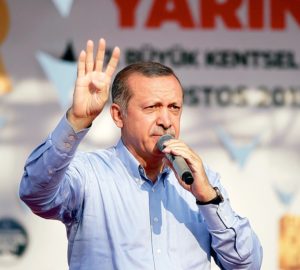
ERDOĞAN FRUSTRATED FOR FAILING TO ENLIST OIC AGAINST EGYPT
In the wiretap Erdoğan was recorded as recalling his earlier conversation with Ekmeleddin İhsanoğlu, the then-secretary-general of the Organization of the Islamic Cooperation (OIC), who warned Erdoğan that Turkey would be left alone if it continued with its anti-Egypt policies. Erdoğan told al-Qadi what he told the OIC secretary-general. “What do you mean by loneliness? I told him Allah is with us, is that not enough?” Erdoğan recounted as having said in his conversation, adding: “You have to look at it from the perspective of whether we are doing the right thing or not. … I told him Allah is with us, leave out all the others [who oppose Turkey’s policy with Egypt].” Al-Qadi agreed with Erdoğan and pointed out that he was correct in his policies.
Moreover, Erdoğan said his government would convene the OIC for an emergency meeting and use the platform to help the Muslim Brotherhood.
The wiretap authorization was granted by a Turkish court:
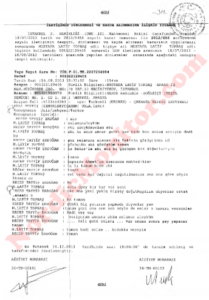
Yet, the OIC was not mobilized, defying Erdoğan’s wishes, which prompted him to instruct his team to go after İhsanoğlu. He was not happy that the OIC did not back him up in his campaign against the interim Egyptian government at the time and was quite angry at İhsanoğlu, a Turkish national whose nine-year term as head of the organization was set to expire at the end of 2013. As ordered by his boss, then-Deputy Prime Minister Bekir Bozdağ called on İhsanoğlu to resign from his post at such an “ineffective” organization in a television interview on August 18. “When such an organization has failed to raise its voice about Egypt, it is in denial of its raison d’être. If I was İhsanoğlu, I would have already resigned,” said Bozdağ.
In another criticism of İhsanoğlu, Hüseyin Çelik, then-deputy chairman of the ruling Justice and Development Party (AKP), tweeted on the same day: “Is there anyone who knows what İhsanoğlu is doing? This person denounced [ousted Egyptian President] Morsi after the coup.” Expressing his disapproval of the OIC remaining silent about the coup, Çelik also noted: “When will this organization speak out, if not now? Or are countries influential in this organization as a result of their financial contributions?” referring to the oil-rich Arab countries that were backing the interim government.
In the taped conversation al-Qadi was using the phone of Mustafa Latif Topbaş, a corrupt businessman and long time family friend of Erdoğan, who had called the prime minister and said “the uncle” — a code name to refer al-Qadi — wanted to talk to him. At the time, al-Qadi was conducting secret business deals with Topbaş, Erdoğan’s son Bilal and other associates in violation of Turkish laws.
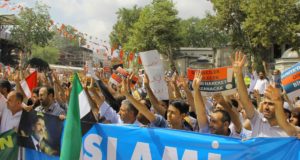
Erdoğan’s ally Morsi was ousted from power amid popular protests on July 3, 2013, backed by the Egyptian military. In a major blow to Turkey’s important ties to Egypt, a major Arab nation, President Erdoğan has aligned himself with the Muslim Brotherhood and refuses to recognize Egyptian President el-Sisi and his government as legitimate. He offered sanctuary for the MB leadership and turned Turkey a regional hub for the Brotherhood’s international network.
In August 2013 Turkey and Egypt recalled their ambassadors after Erdoğan’s clear stand in favor of the Brotherhood and scaled back their diplomatic relations to the level of chargé d’affaires.
Al-Qadi and Erdoğan’s son Bilal were leading suspects in an investigation into corruption pursued by prosecutors in Istanbul and were the subjects of detention warrants issued on December 25, 2013 by the prosecutors. However, Erdoğan stepped in, illegally preventing the execution of the warrants by ordering the police to ignore the prosecutor’s orders. After the removal of the prosecutors and police chiefs who were involved in the investigation, Erdoğan managed to whitewash the crimes of his associates.
The wiretap was authorized by the Istanbul 2nd High Criminal Court, which was looking into terrorism-related cases. The authorization was granted on August 18, 2013 as part of investigation file No. 2013/7296.



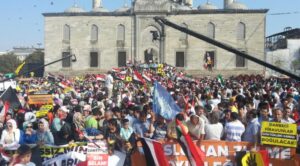 June 18, 2020
June 18, 2020 